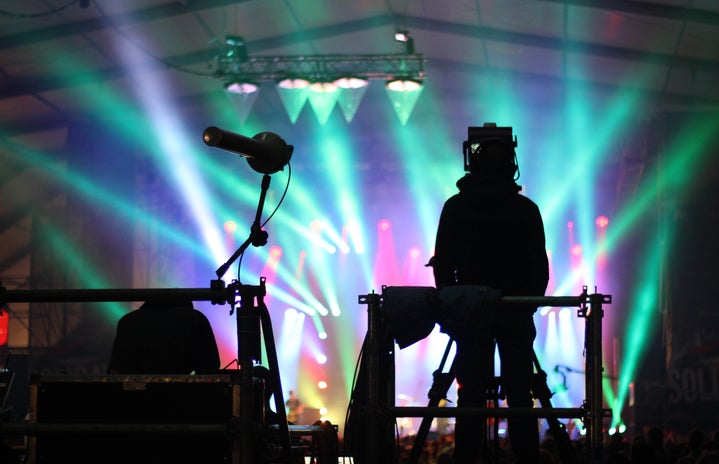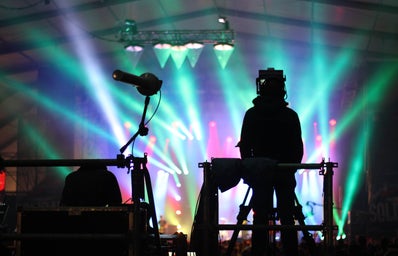Do you remember that infamous scene from Black Swan? Nina (played by Natalie Portman) and Lily (Mila Kunis) go out drinking, then return to Nina’s house. Things start getting spicy, and as Nina looks down between her legs, she sees something that she did not expect. The two women already look remarkably similar – both waif-thin brunettes with dark eye makeup. But rather than seeing Lily’s face, Nina sees her own face reflected back at her.
The highly controversial song “Girls” features Rita Ora in a cream-colored dress lounging on a couch, surrounded by women with the same hairstyle and clothing as her. Visually, it appears as though Ora is surrounded by dozens of copies of herself.
More recently, Ariana Grande’s music video for “break up with your girlfriend, i’m bored” shows a man and a woman who walk into a bar as a couple. The woman looks strikingly like Grande, with long brown hair in a high ponytail. Grande joins the couple but seems much more infatuated with the woman than with the man. As the music video comes to its conclusion, the man makes a move towards Grande, but the woman gets there first. The video fades out as Grande and her lookalike’s lips are about to meet.
In Nina’s example, the scene is used as both a symbol of her growing insanity and her self-obsession. Ora appears to have used it as an aesthetic choice. For Grande, it is a literal portrayal of her lyrics from “thank u, next” about how she’s dating herself now.
In addition to nearly exact copies of one another, this trope may also be used as a portrayal of an alter-ego. Seen in Dua Lipa and St. Vincent’s recent eye-fucking-laden performance, the characters of Marissa and Alex in The OC, and Madonna’s 2003 VMA performance, this trope usually features a woman in white and a woman in black as perfect aesthetic opposites.
Straight women have made use of lesbianism in popular culture for a long time. One of the most glaring examples of this is Katy Perry’s “I Kissed a Girl,” featuring soft pinks, kittens, and Perry’s insistence that although she kissed a girl and liked it, she doesn’t think it means anything, and she hopes her boyfriend doesn’t mind. (Side note: this song is spicier than you might think. Look up “cherry chapstick” on Urban Dictionary. Regardless, still a highly problematic song, especially that boyfriend line if you’re looking at it in that context.)
I’ll admit that I’m desperate for representation. Sometimes I’m willing to settle. Usually, I’m willing to settle. I take whatever representation I can find, because it’s better than nothing.
And I’m fucking tired of it. I’m fucking tired of having to settle.
There is huge privilege in being able to wear a lesbian label for a day before returning to a heterosexual self. Lesbians are often seen as predatory by women, and as a porn category by men. For more on this, I recommend fellow Her Campus writer Morgan Smith’s article titled “Lesbian is Not a Bad Word.” Needless to say, there are experiences lived by lesbians that cannot be understood by a heterosexual person who wears a lesbian costume when they feel like it.
This is not to say that the people who make use of this trope are all straight; St. Vincent, for instance, has dated both men and women, and Rita Ora and her collaborators are all self-identified bisexual women. But the majority of those who have used this have been heterosexual women. The use of lesbian tropes by men is beyond the scope of this article, but is often exceedingly problematic (for example, Blue is the Warmest Color, now believed to be shot unethically).
It has been admittedly fun to see queer creators making use of this trope as satire. Broad City, one of my favorite current comedies, has a short side plot where Ilana is sleeping with a woman named Adele who is nearly identical to her. This is played for laughs as being a nearly masturbatory experience, with both women knowing their own bodies as well as they knew each other’s instantly.
And since this article spoke so much about music, it would be wrong to leave without some recommendations for good, queer content by women about women: I suggest Hayley Kiyoko, King Princess, Zolita, and Janelle Monet.
–
This article was inspired by Buzzfeed New’s “Ariana Grande And Dua Lipa Are Joining Pop Culture’s Lesbian Lookalike Party”



